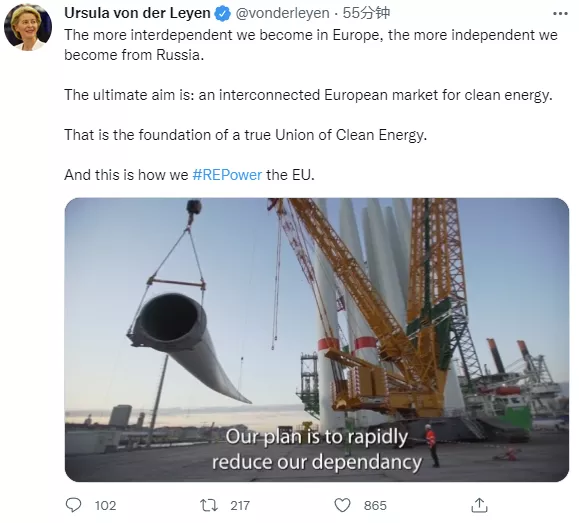On May 18 local time, the EU launched an investment plan with a total amount of about 300 billion euros (about 212.7 billion yuan), aimed at reducing dependence on Russian fossil fuels and accelerating the transformation to clean energy in the next few years According to the associated press on May 18, the plan is called REpower EU, which means "re energizing the EU".

European Commission President von delaine said the plan will help EU countries get rid of their dependence on Russian energy as soon as possible.
According to the EU plan, from now to 2027, EU countries should gradually reduce their dependence on Russian natural gas, oil and coal to zero, and should accelerate the development of renewable energy and improve fuel utilization, so as to achieve the EU's goal of coping with climate change.
According to the EU, it is estimated that the whole plan will need to invest 210 billion euros by 2027 and will increase to about 300 billion euros by 2030. Von delaine said that the funding source plan is mainly loans and donations, and some proposals need to be negotiated with the European Parliament and EU Member States.
In addition, von der lain proposed to increase the EU's 2030 energy-saving target from 9% to 13%, and the share of renewable energy from 40% to 45%.
The report points out that the EU has also proposed ways to simplify the approval procedures of renewable energy projects in EU countries. Originally, it may take up to 10 years for these projects to be approved, but according to the newly proposed method, the approval time will be shortened to one year or less.
Since the outbreak of the conflict between Russia and Ukraine, the EU has imposed a number of sanctions on Russia. The EU's ban on Russian coal imports will take effect in August and said it plans to reduce the demand for Russian natural gas by two-thirds this year. In terms of oil, as Hungary and other EU countries are worried about their own energy security, they are unwilling to approve the EU import ban on Russian oil. Data show that about 40% of the energy imported by the EU comes from Russia, including natural gas, 30% of oil and nearly 20% of coal.